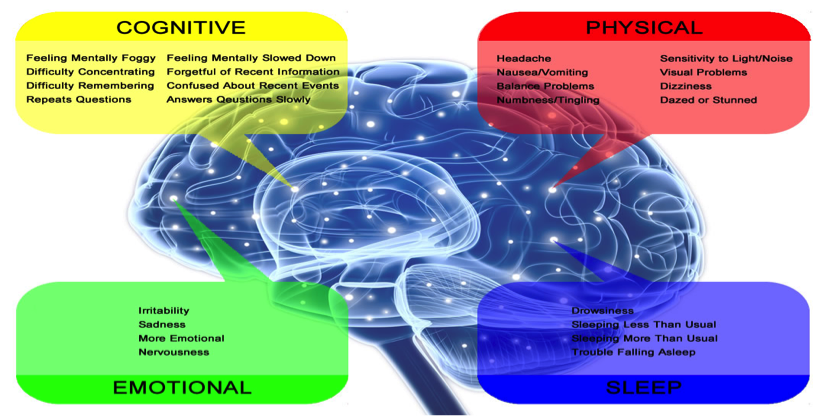“Traumatic brain injury (TBI) increases Ca2+ [calcium] influx into neurons and desynchronizes mitochondrial function leading to energy depletion and apoptosis. This process may be influenced by brain testosterone (TS) levels, which are known to decrease after TBI.” Study: Carteri, Randhall B., et al. “Testosterone Administration after Traumatic Brain Injury Reduces Mitochondrial Dysfunction and Neurodegeneration.” Journal of Neurotrauma, vol. 36, no. 14, 2019, pp. 2246–2259, doi:10.1089/neu.2018.6266.
Here’s a breakdown of the above (1st 2 sentences from a research article on concussions):
- Increased Calcium Influx into Nerve cells: TBI leads to a disruption in the normal functioning of brain cells, including the regulation of calcium ions. Under normal conditions, calcium ions play critical roles in neuron function, including neurotransmitter release and signal transduction. However, excessive Calcium influx into neurons can be harmful, triggering a cascade of events that lead to cell damage and death.
- Desynchronization of Mitochondrial Function: Mitochondria are the powerhouses of the cell, generating the energy required for various cellular activities. TBI can disrupt the normal functioning of mitochondria, leading to a mismatch in the demand and supply of cellular energy. This disruption can cause energy depletion, further exacerbating the damage to brain cells.
- Energy Depletion and Apoptosis: The combined effect of increased Calcium influx and impaired mitochondrial function is a significant depletion of the cell’s energy reserves. This energy depletion, in turn, can trigger apoptosis, or programmed cell death, a process where cells systematically dismantle themselves. While apoptosis is a normal biological process, its acceleration following TBI can contribute to the loss of critical brain functions and long-term neurological deficits.

Role of Testosterone and Nutrient Therapies
- Brain Testosterone (TS) Levels: Testosterone is a steroid hormone that, beyond its well-known roles in sexual development and function, also exerts significant effects on brain health. Following TBI, levels of testosterone in the brain are known to decrease. Testosterone has neuroprotective properties, meaning it can help protect neurons from damage. It does so by modulating the response to injury, potentially reducing the harmful influx of Ca2+, stabilizing mitochondrial function, and thereby mitigating the processes leading to energy depletion and apoptosis.
- Nutrient Therapies (e.g., Magnesium): Magnesium plays a pivotal role in brain health, including the regulation of calcium ion channels and protection against excitotoxicity (cell death caused by overactivation of receptors for the excitatory neurotransmitter glutamate). Supplementing with magnesium post-TBI could help by blocking excessive calcium influx into neurons, similar to the protective role of testosterone, thereby offering a therapeutic avenue to mitigate the damaging cascade initiated by TBI. Consult a Naturopathic doctor and be sure you’re taking the proper form and dosage of magnesium (to ensure absorption from the stomach and uptake into the brain).
In summary, the above line from the research study highlights the complex interplay between traumatic brain injury, calcium regulation, mitochondrial function, and the protective roles of testosterone and potential nutrient therapies. By moderating the influx of calcium into neurons, supporting mitochondrial function, and compensating for the drop in testosterone levels post-TBI, therapies involving nutrients like magnesium and hormones like testosterone could offer promising avenues for mitigating the adverse effects of TBIs, improving recovery outcomes, and preserving brain function.
Consult a Naturopathic Doctor and include them in your post-concussion care team!
Yours in Health,
Dr. Negin

